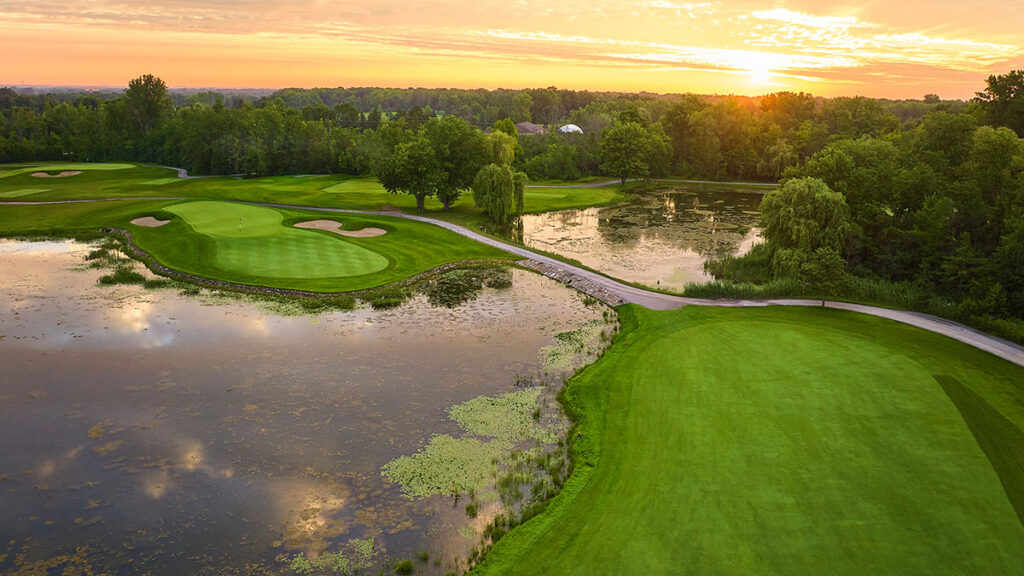Presidents Cup 2024 Preview: The Royal Treatment – Australian Golf Digest

- by Admin
- August 28, 2024

The three holes that will decide the Presidents Cup.
This September when the Presidents Cup returns to Canada for just the second time, the International team will be looking to put up a better fight than the 19½ to 14½ loss to the United States the last time the event was played at Royal Montreal Golf Club’s Blue course, in 2007. The Blue won’t offer many different opportunities for improvement: it remains a tight, stringent, shot-maker’s design with treelined fairways, thick rough and small elevated greens.
Though founded in 1873 and purported to be the oldest in North America, the club has only been playing its current courses, the Blue and Red, since 1959 when it moved from a location in historic Montreal to Ile Bizard six kilometres west. Dick Wilson built both courses on what was mostly farmland and apple orchards, stuffing the Blue full of doglegs and deep greens requiring precision aerial approaches. Rees Jones, who remembers walking the property as a boy when his father, Robert Trent Jones, interviewed for the job, remodelled the course in 2004 and 2005, though he was respectful of Wilson’s tenets of mid-century architecture (only the 12th and 13th holes were fundamentally altered). Jones and design associate Bryce Swanson have been back to make minor tweaks, but success will still come down to how the players navigate the formidable closing stretch where water lurks on the final five holes. Here are three late-game land mines that will help determine the matches.
14th hole
366 metres / 400 yards, par 4
Four blowout matches ended on the 14th hole in 2007, including an impressive 5&4 win by Vijay Singh and Stuart Appleby over Tiger Woods and Jim Furyk in Friday’s fourballs. Studious viewers might recognise the Blue’s 14th as a mirror image of another popular Dick Wilson hole, the 18th at Bay Hill. A lake extends the length of the fairway on the left beginning at 230 metres and continues up to the front of a shallow green that hooks left around the water. The landing area is just 25 paces across, so most players will hit less than driver for safety and approach the green with 9-irons or wedges. New front tees were created during the remodel and could be used to make a 285-metre hole that coaxes desperate teams into attempts to drive the green.

15th hole
410 metres / 448 yards, par 4
If the 14th is reminiscent of the closing hole at Bay Hill, the 15th follows a similar strategic construct of another classic Wilson finisher, the 18th at Doral’s Blue Monster. A decision must be made on the tee: lay up to the wide section of the fairway at the 230-metre mark leaving a long approach into a deep, skinny green bracketed by bunkers or push further down the hole by carving a drive around trees to an ever-narrowing landing zone with a lake cutting in from the left. Any drive hit too straight or too far left will be in the water. The green used to be set just beyond the water but was pushed back 40 metres to give members safe harbour short, and the putting surface is cut into distinct pinning sections by prominent steps and swales.

17th hole
144 metres / 157 yards, par 3
Nearly half of the 34 matches in 2007 (16) were closed out on this par 3. Playing to a similar length as the seventh, the 17th green was moved closer to the water on the right in 2004. Ordinarily a wedge or short iron for the professionals, the hole can be stout when the prevailing crosswinds blow from the left. Front hole locations between two bunkers are tight, but players will be able to get the ball close working off a backstop. Another bowl to the back left of the green will also help collect balls and swing matches with birdies when pins are set there. The back-right hole locations near the lake will make for nervous, do-or-die tee shots, especially for players or teams trailing in their matches who need to go flag hunting.
The Latest News
-
January 9, 2025Every Aussie player at Australian Open 2025: Meet this year’s local tennis contingent | Sporting News Australia
-
January 9, 2025TaylorMade New Releases for 2025 – Australian Golf Digest
-
January 9, 2025Fan makes hole-in-one over Bryson DeChambeau’s house on fifth(!) attempt to win $100K(!!) prize – Australian Golf Digest
-
January 9, 2025Tennis: Australian Open 2025 preview, full schedule, and how to watch the first grand slam of the season
-
January 9, 2025Barty-like Aussie teen who has opponents running ‘scared’





